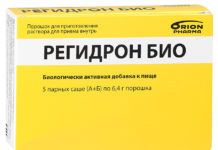Flax is one of the oldest cultivated plants on earth. Archaeologists have found flax seed food and linen in the Neolithic settlements. The centuries-old history of flaxseed oil has led to its widespread use in folk medicine, cosmetology, and cooking of all the peoples of the world. Modern scientific literature contains many studies of linseed oil, the benefits and harms and how to take it as a medicine.
Material Content:
The benefits of flaxseed oil
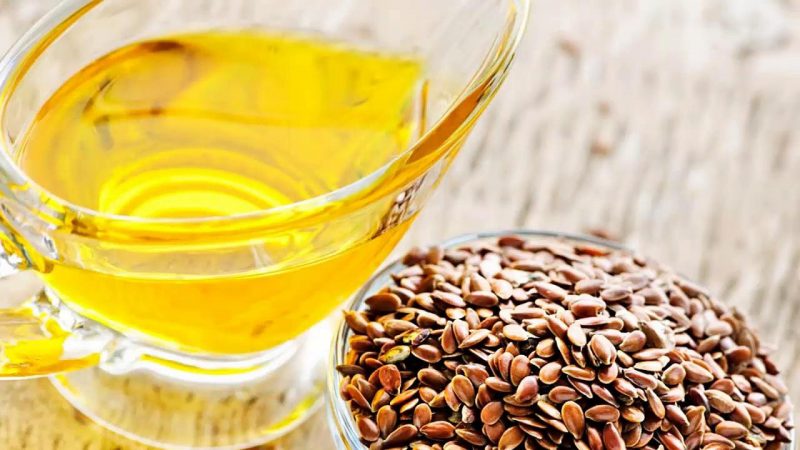
From ancient times flaxseeds and the oil obtained from them were used in folk medicine as medicines for:
- skin diseases;
- burns;
- colds and inflammatory diseases of the respiratory system;
- asthma
- gout
- rheumatism;
- defecation disorder (diarrhea or constipation);
- painful periods (dysmenorrhea);
- gonorrhea;
- cystitis.
The book "Russian Herbalist", created on the basis of text documents of the XIX century, describes not only the properties of flax, but also recipes for its use. For example, it is mentioned that linseed oil (LM) was used not only as an independent medicine for external and internal use, but also as part of ancient balms - sulfuric and Harlem. They were prepared on the basis of linseed and turpentine oil, dissolving sulfur in a mixture.
Hippocrates advised using flaxseed oil to treat stomach inflammation, various pains and burns. The Egyptians widely used it not only in medicine, but also in cosmetology. The ancient Egyptians called it "living water" for its ability to maintain youthful skin and maintain the health of the whole organism.
The beneficial properties of linseed oil are due to its unique composition, which is represented by:
- monounsaturated acids (14-16%), the main of which is oleic (13.8-14.6%);
- saturated fatty acids (~ 10%):
- palmitic (3.5-5.2%);
- stearic (2.7-4.3%).
Most (60-80%) are polyunsaturated fatty acids. Of these, 57-64% are linoleic acid, which is an omega-3 essential fatty acid. In oil, the ratio of Omega-3 (49-64%) and Omega-6 (14-18%) is ideal. It contains linetol, which is used for the prevention and treatment of atherosclerosis (oral) and for the restoration of the skin after thermal, chemical and radiation burns (externally).
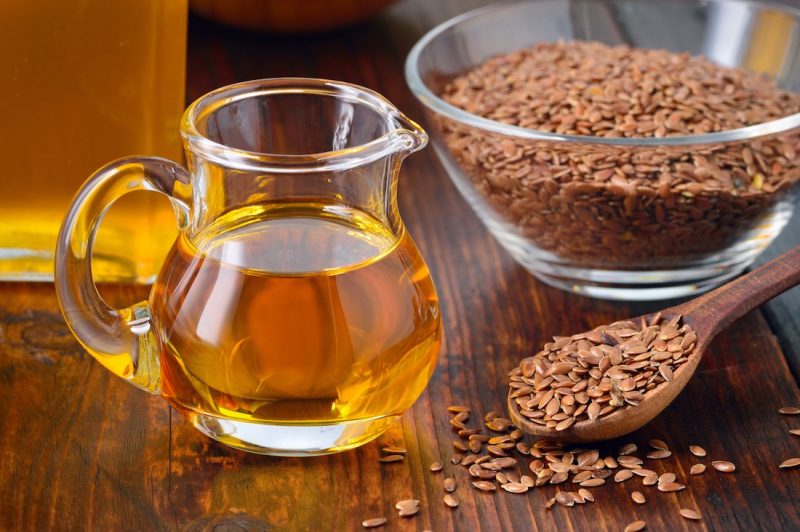
Polyunsaturated fatty acids (PNA) in the oil reduce the level of cholesterol in the blood and liver cells, have a beneficial effect on the composition of the blood - prevent the formation of blood clots.
It is worth mentioning that most vegetable oils contain a sufficient amount of Omega-6, but Omega-3 supplies only the fat of marine fish and LM to the body. Moreover, in Omega-3 oil is twice as much as in fish oil. In addition to gamma - linolenic (omega-3) and linolenic (omega-6) acid triglycerides, the oil contains about 10% of omega-9 - oleic acid.
Flaxseed oil contains a large number of macrocells (sodium, magnesium, iron, silicon, copper) and essential microelements (selenium, chromium, cadmium, bismuth, lithium).
The tocopherol contained in the oil has a strong antioxidant effect, due to which it has regenerative, anti-aging, anti-cancer properties.
In addition to vitamin E (tocopherol), oil also contains other vitamins necessary for the human body:
- B1 is thiamine;
- B6 - pyroxylin;
- B9 - folic acid.
Flaxseed oil is one of the richest (0.3 g / 100 g) lignans in plant foods. A professor at the University of Toronto, Lillian Thompson, published the results of many years of research on the effect of flaxseed on breast and rectal cancer.
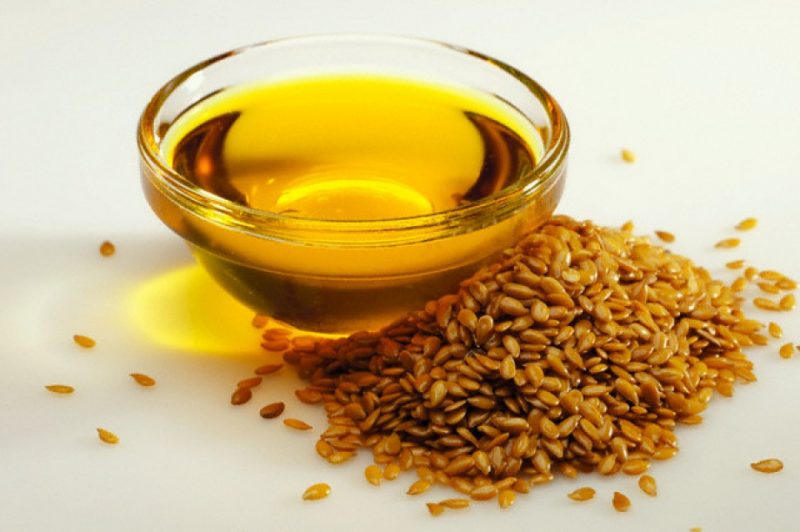
In addition, it was found that lignans have an antioxidant effect, causing a positive effect of LM in the prevention of:
- hypocholesterolemic atherosclerosis;
- diabetes mellitus type I and II;
- endotoxic shock.
Numerous clinical studies of the medicinal properties of the product have shown that it has a number of unique properties:
- anti-sclerotic;
- antiarrhythmic;
- antithrombotic;
- anti-inflammatory;
- anti-allergic.
The listed properties are not an exhaustive description of the medicinal effect of LM, its potential continues to be studied.
In addition to therapy, its useful properties are also used in the prevention of many diseases, nutrition, cosmetology.
Useful properties for women
The importance of linseed oil in home cosmetology is known to all women who are fond of prolonging the youth of the face and healthy hair. In addition to the cosmetic effect, it has a rejuvenating effect on the woman’s body during menopause. Lignans are similar in structure to endogenous sex hormones. During menopause, their number decreases, which leads to hormonal imbalance and somatic diseases.
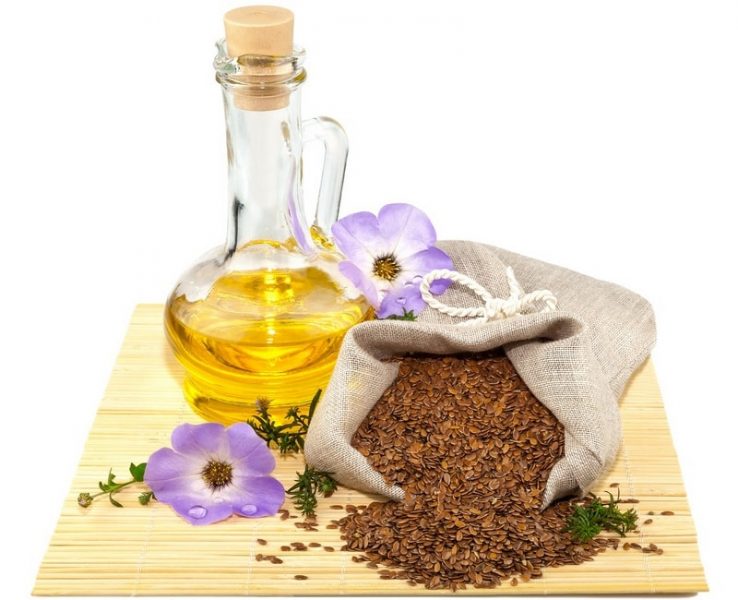
Climax is accompanied by:
- decreased mental ability and memory;
- increased risk of developing atherosclerosis and hypertension;
- violation of the gastrointestinal tract;
- imbalance in the process of destruction and formation of bone tissue (osteoporosis);
- the occurrence of tumors in hormone-dependent tissues, especially in the mammary gland and genitals.
In reproductive age, a decrease in the production of female sex hormones leads to a violation of the monthly cycle and infertility. Application of only 1-2 tsp Flaxseed oil 2 times a day helps to reduce the manifestations of menopause and restores the balance of estrogen.
Flaxseed not only prevents the occurrence of breast cancer, but also delays the progression of the tumor process. In addition, LM is useful for a woman in the gestational and lactational period, as it causes structural changes in the mammary gland. The use of LM during pregnancy contributes to the proper formation of the fetal nervous system.
In old Russian herbalists advised to use LM in difficult births "lubricating the mouth of the uterine sleeve." Phytoestrogens LM reduce the severity and frequency of hot flashes with menopause, and essential fatty acids stop bleeding, including with heavy periods.
Flaxseed oil helps reduce the severity of premenstrual syndrome, relieves pain, improves mood, and helps with depression. Omega-3 fatty acids improve the absorption of iodine and calcium, which prevents the development of diseases of the thyroid gland and the appearance of osteoporosis - typical pathologies associated with menopause.
What diseases does it help?
Flaxseed oil is good for women and men, at any age. Scientists of Canada. Germany, the USA and Russia studied its medicinal properties.
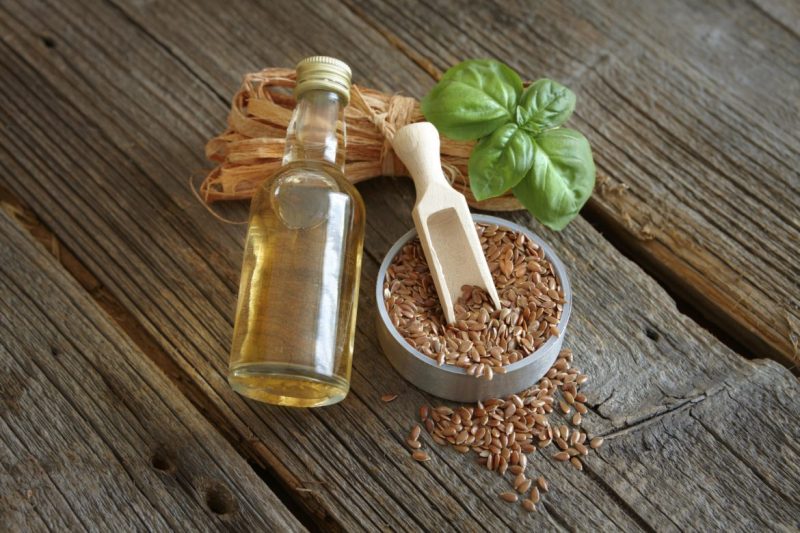
It turned out that it affects all organs and systems:
- GI tract with:
- constipation
- bloody diarrhea;
- gallstone disease;
- dyskinesia of the gallbladder (stimulates the production and outflow of bile);
- inflammation of the intestines and stomach;
- irritable bowel syndrome;
- diverticular disorder;
- colorectal cancer;
- hemorrhoids;
- respiratory system with:
- asthma
- inflammation of the bronchi;
- dry cough;
- hemoptysis;
- urinary system with:
- urolithiasis;
- bladder inflammation;
- renal failure;
- reproductive system with:
- decreased libido;
- impaired sperm synthesis;
- infertility caused by an imbalance of sex hormones;
- skin diseases with:
- eczema
- dermatitis of various etiologies;
- psoriasis
- furunculosis;
- acne;
- endocrine system with;
- diabetes mellitus type I and II;
- adrenal dysfunction;
- musculoskeletal system with:
- arthrosis and arthritis;
- circulatory system with:
- a stroke;
- heart attack;
- hypertension.
Its beneficial substances help cleanse the body of toxins and toxins and facilitate the elimination of stones - stones and sand.
Oil helps to normalize metabolic processes, especially lipid, which helps prevent atherosclerosis. It is established that the reception is only 1 tbsp. l per day by 37% reduces the risk of atherosclerosis and related diseases.
Also, external and internal use of oil helps with rheumatoid arthritis. Rubbing the inflamed joints in 60% of cases helped patients completely abandon anti-inflammatory drugs and significantly reduce their intake in 40%. It helps in the postoperative period, as it can increase overall immunity.
LM is of great importance in case of prostatic hyperplasia. Reception of oil helps to relieve inflammation, stop the proliferation (reproduction) of cells and reduce the relative mass of the gland, as a large number of lignans with estrogenic / antiestrogenic properties are produced in the body.
In clinical studies of scientists at the University of Toronto, it was found that supplementation of flaxseed and oil from them in the food of patients with lung cancer significantly reduced lung metastases and inhibited (blocked) the growth of metastatic tumors formed in the lungs.
Multiple sclerosis is another disease that can be treated with linseed oil. At the University of Oregon (USA), over the course of 35 years, research has been conducted on this serious disease. A diet with a high content of fatty acids and low - EFA, helped to stop the development of prussic dementia and Parkinson's disease. Omega-3 fatty acids, which are contained in large quantities in LM, are involved in the protection and construction of the "insulating layer" of nerve fibers - myelin sheaths.
The use of flax oil in cosmetology
The useful properties of LM are still being investigated, and its benefits are being debated by the world scientific community, but the fact that it has been used and continues to be used by beauties for 9000 years indicates the effectiveness of its use in cosmetology.
The ancient Egyptians knew about the benefits of LM for face and hair. They used oil, both pure - for compresses and masks, and in combination with juices, decoctions, infusions of medicinal plants.
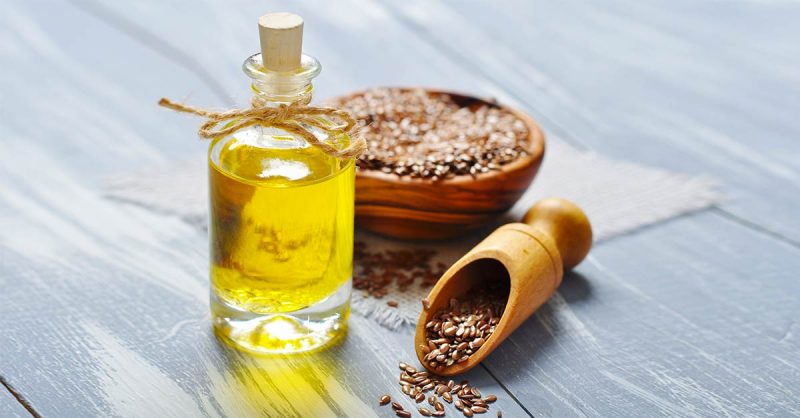
It has a beneficial effect on the structure and appearance of the epidermis:
- eliminates the first signs of age-related skin changes - dryness, wrinkles, sagging, age spots (thiamine, niacin);
- It has a tonic and lifting effect (niacin);
- contributes to the preservation of moisture in the skin;
- protects the epidermis from harmful external influences (folic acid);
- treats skin diseases, acne, abscesses, eliminates inflammation of the epidermis (folic acid);
- has whitening properties and improves complexion (phylloquinone);
- soothes, relieves irritation (choline);
- regenerates and stimulates the production of collagen, reduces the severity of striae (stretch marks).
Moreover, the oil has a complex effect and eliminates all of these problems.
For hair, masks with LM are also necessary. It:
- restores the fat balance of the scalp and eliminates dandruff;
- provides firmness and elasticity of the hair shaft;
- gives the hair a lively shine;
- stimulates growth;
- prevents falling out.
In folk medicine and home cosmetology, to enhance the effect of LM, it is combined with flour from flax seeds or applied to linen cloth to prepare compresses and masks.
Useful properties for weight loss
LM normalizes metabolic processes, actively affects lipid metabolism, and therefore its effectiveness in dietetics is proven.
According to scientists, only 30-40 g of LM per day satisfies the need of the human body for fatty acids. In Russia, its use in food was the norm. Today in the world suffering from obesity, interest in LM has again increased. In Europe and America, its use increased tenfold. In America, it is used in the preparation of salad dressings, and flax seeds are required in school meals. In Germany, LM is used for dressing vegetable salads, cottage cheese. In Canada, it is added to margarine.
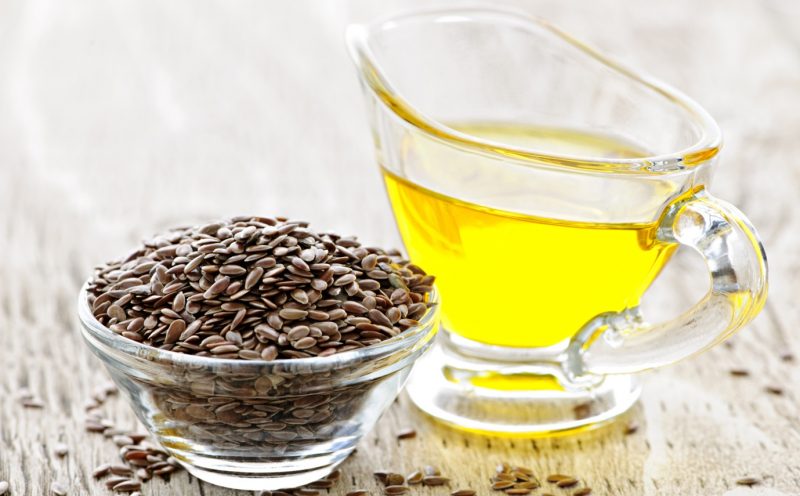
LM nutritionists recommend overweight as easily digestible and inhibitory synthesis of "bad" cholesterol. LM contains precursors of lignans, which are similar in their properties to sex hormones. With age, hormone production decreases, which also leads to the accumulation of adipose tissue and weight gain. Normalization of the hormonal balance when using LM promotes weight loss.
Lignans promote the synthesis of growth hormones, which stimulate the formation of protein and lead to the breakdown of body fat during physical activity.
In the book "We are growing thin in two accounts" A. Faleeva studied and systematized the methods of losing weight that are used by professional athletes. If necessary, they can easily gain or reduce their weight by 30-50 kg in a short time.
The author derives a weight loss algorithm:
- colon cleansing;
- liver cleansing;
- getting rid of helminths.
All these tasks can be solved using LM. Enemas with warm LM effectively cleanse the colon from feces. Russian herbalists advised adding “1-2 lots of flaxseed oil to the washings” (1 lot equals 12.79725 grams). After the intestine is cleansed of fecal stones and mucus, its microflora is restored by eating flaxseeds - a source of dietary fiber and mucus.
LM enhances the secretion of bile, promotes detoxification of the liver and protects its cells from damage. But before cleaning the liver, it is necessary to undergo an examination, since the product with some pathologies of the liver and biliary tract can cause deterioration.
Flaxseed oil and seeds help get rid of helminths.Mucus in the seed coat creates a kind of barrier for the fixation of worms in the intestinal mucosa and interferes with their nutrition, and substances in the oil have a paralyzing effect on parasites and facilitate their excretion with feces. Drinking 1 tsp. 30 minutes before a meal helps to cleanse the body of helminths and toxic products of their vital activity.
Adding oil to a salad or cottage cheese during dinner promotes the breakdown of fat, speeds up metabolism. The use of linseed oil, flax seeds, proper nutrition and moderate physical activity will allow you to lose weight in a short time without harming your health. This is a valuable food product. One gram of oil replaces 2.25 g of sugar, 4 g of bread, 8 g of potatoes. That is why when in Russia during fasting they switched to its use, health did not suffer and the peasants retained strength for hard physical work.
How to take linseed oil?
Flaxseed oil can be used as an independent substance (monotherapy), or in combination with other medicinal plants, and also added to dishes - mixed with proteins (cottage cheese, cheese, kefir), carbohydrates (cereals, honey, syrups), fruits and vegetables.
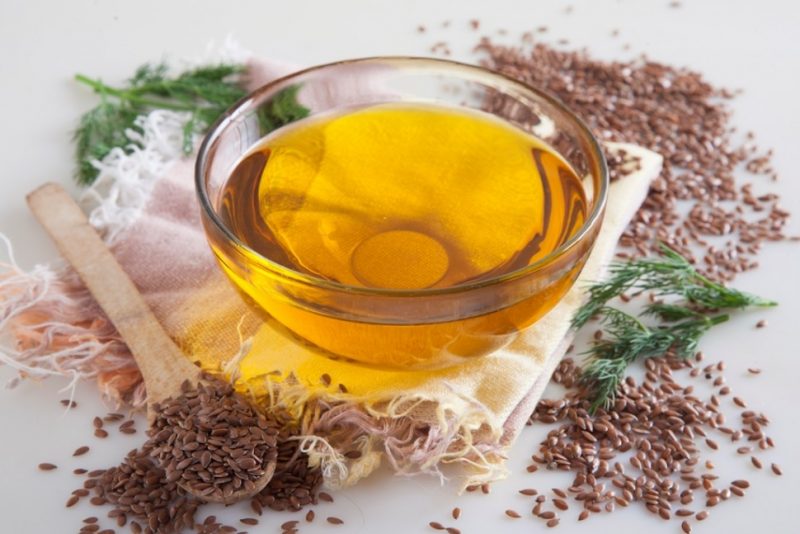
Independently apply oil for 1-2 tbsp. tablespoons 2-3 times a day for 2-3 months. For external use, they are impregnated with tissue to apply compresses or rubbed into a sore spot.
Can I use it on an empty stomach?
Flaxseed oil is recommended to take 1 tbsp. spoon in the morning on an empty stomach. When unpleasant symptoms appear, its amount can be halved. As a rule, discomfort disappears after 3-5 days of use.
How to choose and store linseed oil?
All the healing properties of linseed oil are true only for the product obtained by cold pressing, since when heated, many useful substances are oxidized or decomposed. Cold-pressed oil has the color of ripe corn, transparent, without inclusions and sediment. The taste of the cold pressed product is different from the oil obtained from the fried seeds, it is specific with a slight astringency and aftertaste, which some compare with the aftertaste from the use of fish oil.
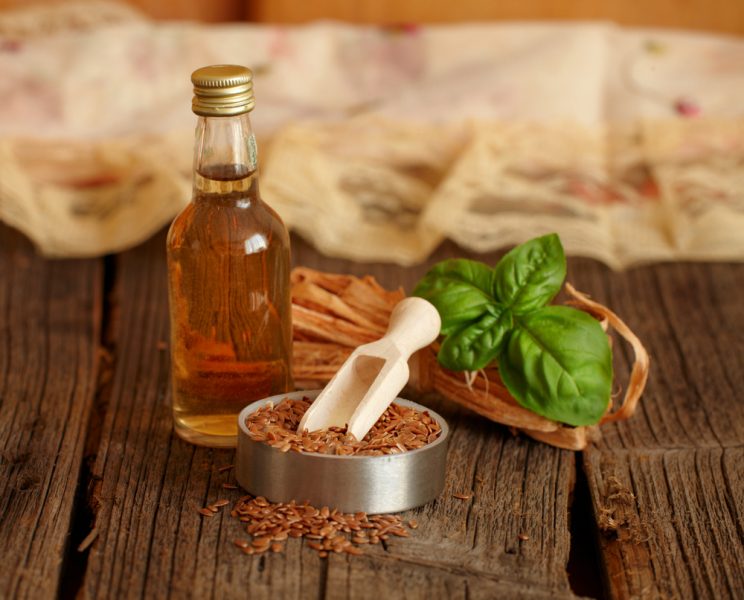
Flaxseed oil quickly thickens in the air and deteriorates under the influence of direct sunlight. Therefore, you need to store it in a bottle of dark glass. After opening, the containers of LM are stored at a temperature of 5-25 ° C in a dark place (in a cabinet or on the refrigerator door) with a tightly closed lid. The shelf life of natural oil from flax seeds is also limited and is no more than 2-3 months, and after opening the bottle - no more than 1 month.
The packaging should not contain any labels other than the name of the oil. All the information that it is “enriched with vitamin E, selenium, silicon” is an advertising trick. Since all of these substances are already available in natural oil.
Contraindications and possible harm
Contraindications to the use of linseed oil as a medicine are various diseases of the gallbladder, liver and bile secretion system.
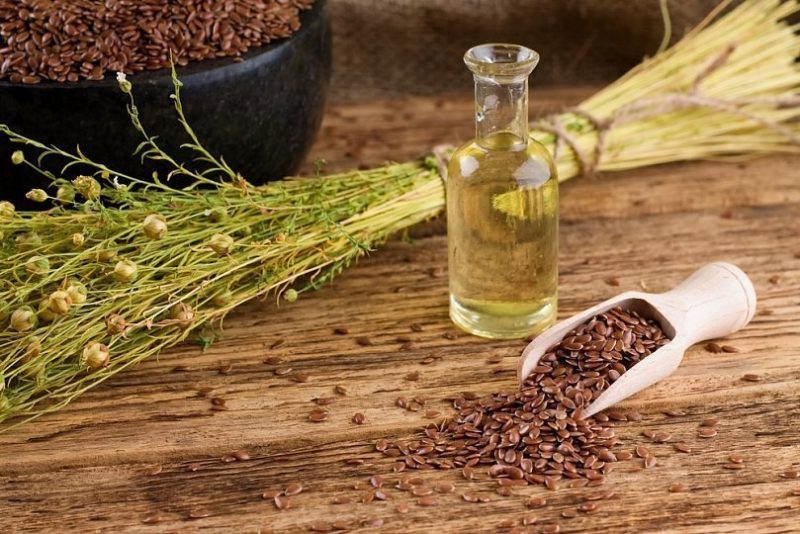
It is not recommended to be treated with:
- hepatitis;
- gallstone disease;
- cholecystitis;
- pancreatitis in the acute phase;
- polyps in the reproductive system of women.
It is not recommended to use along with some medications:
- against diabetes;
- cholesterol lowering;
- affecting blood coagulation;
- antidepressants;
- oral contraceptives;
- laxatives.
The possible harm in taking the oil can be caused by excessive intake of omega-3 fatty acids. Excessive use of it can lead to bleeding, the appearance of hematomas (bruises), and a decrease in visual acuity (in the elderly).
Studies published in Science Daily showed that consuming LM in its purest form and on an empty stomach in the third trimester of pregnancy can cause premature birth.
A sensible approach to the use of oil and knowledge of the presence of contraindications will help to use this unique natural product in the prevention and treatment of many diseases, diet therapy and the preparation of a balanced healthy diet.
- Hope







